- Home
- David Downing
Lehrter Station Page 11
Lehrter Station Read online
Page 11
Russell laughed and took her arm.
A few minutes later they reached the iron archway entrance. It was unguarded. Passing through, they found the rooms of the old Pathology Department deserted. ‘This is where we slept,’ Effi told him, pointing out a corner of the first one. It was empty, save for a table with two broken legs which seemed to be kneeling in the middle of the floor. ‘And that’s where Dobberke signed our release certificates,’ she added, gesturing towards it.
When Russell glanced at her, she was angrily wiping tears from her eyes.
‘I’m okay,’ she said again. ‘Can you see anything out of those windows?’ she asked, pointing to the row on one side.
Raising himself on tiptoe, he reported movement in the distance.
‘That’s the main hospital,’ she explained. ‘All the half-and quarter-Jews lived there. There’s a connecting tunnel.’
This had been guarded in April, but now stretched emptily away, lit only by a fortuitous rent in its ceiling almost halfway down. A ladder leant against the rim of the opening, and Russell had a mental picture of Nazi guards slipping out into the Berlin darkness as Russian troops stormed the main entrance.
At the far end of the tunnel, they emerged into a different world, one that was tidy, well-lit and obviously populated. After passing a couple of almost empty dormitories, they climbed the stairs to the ground floor. Here, they found rooms where people were sitting and reading, and one with rows of desks that was clearly in use as a classroom. The first person they asked for directions shrugged and offered a few words in Yiddish, the second informed them in Polish-accented German that the offices were on the next floor. Halfway up the stairs a rabbi passed them on his way down.
In the administration office a young woman was laboriously pushing down keys on an antique-looking typewriter. She smiled up at them, revealing warm brown eyes, and seemed relieved to abandon the task. At Russell’s request she explained the current set-up. The hospital was run by an ad hoc committee, which had representatives from all the parties involved. There were reps from the American Jewish organisations, and from international refugee organisations like UNRRA and the Red Cross; there were members of the hospital staff and, of course, liaison officers from the French garrison. New refugees were arriving all the time: survivors of the camps, returnees from voluntary exile, people who’d spent the last few years hiding in barns or cellars or garden sheds. There were ex-partisan fighters, who’d made their way west across Poland from the Russian and Lithuanian forests. The hospital fed, clothed and sheltered them all, and did its best to help each individual reach his or her destination of choice. In most cases this was the American Occupation Zone beyond the Elbe, where purely Jewish DP camps were now up and running, staging posts en route to the promised lands of Palestine and America.
In the meantime the refugees waited, and often for a great deal longer than they wanted to. But at least they were waiting for something better, and the mood was generally good.
Effi asked the woman whether records were kept of all who passed through.
‘Of course. Who are you looking for?’
Effi gave her the names, and watched as she worked her way through the relevant boxes of index cards. The woman was a Berliner from her accent, no more than twenty-five, and almost certainly Jewish. Her whole adult life would have been shot through with fear, Russell thought, but there was nothing downcast about her, no apparent edge of bitterness or well of grief. On the contrary, she seemed full of life. Someone looking forward rather than back.
‘No, I’m sorry,’ she said, coming back to her desk. ‘The only Pappenheim is Greta, and all three Rosenfelds are men. Where else have you looked?’
Effi explained that they’d only just started on their list of possible locations, whereupon the woman insisted on comparing that list with another, which one of the American Jewish organisations had compiled. Three more sites were identified, one of them a recently opened agricultural training camp for Zionists.
They were crossing the downstairs lobby when a familiar face came in through the main doors. Effi had met and befriended Johanna – she had never learnt her surname – during her and Rosa’s week-long confinement in the Pathology department, but once Dobberke had signed their releases Johanna had opted to spend the last few days of the war where she was, rather than risk the streets outside. Now a huge smile engulfed her face, and she enfolded Effi in a fierce hug. ‘Where have you been? I’ve often wondered what happened to you when you left. You and Rosa.’
‘You’re looking well,’ Effi said, and Johanna was. In April she’d been painfully thin, but in her case the ‘Victim of Fascism’ ration card was obviously serving its intended purpose – she looked several stones heavier and ten years younger. ‘We ended up in the Potsdam Station,’ Effi said. ‘It was a nightmare. We should have stayed here with you and Nina.’
Johanna’s smile disappeared. ‘No, you made the right decision. You remember – Nina thought the Russians would behave themselves because we were Jews and because there were so many of us. She couldn’t have been more wrong. I got off quite lightly, but Nina was young and pretty and…’ Johanna sighed. ‘Well, she killed herself…’
Effi closed her eyes for a few seconds.
‘But is Rosa all right?’ Johanna asked anxiously.
‘She’s fine. She’s in England, in London. Which is where we were until last week. This is John, by the way. I must have told you about him.’
‘Yes, you did.’ She gave Russell a knowing look, then turned back to Effi. ‘I met another friend of yours a couple of months ago,’ she told Effi. ‘I work in the hospital, but I was in the office when she came looking for you. Her name was Ali something…’
‘Ali Blumenthal!’ Ali was the daughter of two Jews whom Russell and Effi had befriended in the first years of the war. They had agreed to ‘resettlement’ in the East, but Ali, like Effi, had opted for an underground existence. When they ran into each other in 1942, Ali had put Effi in touch with the identity forger Schönhaus, which had probably saved her life. She and Ali had shared a flat, a business and a life of resistance for most of the next three years.
‘Yes, that was the name,’ Johanna confirmed. ‘I told her I’d met you in April, and she told me who you really were. I was surprised, I can tell you. I must have seen some of your films, but I never recognised you.’
‘Did Ali leave an address?’
‘Not here, but most people leave their contact details on the boards outside. Come, I’ll show you where.’
They walked out onto Iranische Strasse, where a line of boarded-up windows were plastered with scraps of paper and card, some neatly cut and printed, others simple scrawls on scraps. It was Effi who recognised Ali’s elegant handwriting. ‘Hufelandstrasse 27,’ she said excitedly. ‘In Wilmersdorf. I think I know where that is. We must go there.’
Russell smiled. ‘Of course.’
Effi thanked Johanna, and gave her Thomas’s address. ‘Wherever we eventually end up living, he’ll know.’
Johanna was reluctant to let them go. ‘Remember how we all agreed to meet on August 1st, in the Zoo Cafeteria. Well, I went to the Zoo, but there was no sign of you and Rosa, and no cafeteria. I wasn’t surprised, but…’
‘Rosa remembered,’ Effi told her. ‘She was upset. But we were in England, and even if we’d known where you were, we had no way of making contact.’ ‘I’m glad you both made it.’
‘And you,’ Effi said with feeling. With so many gone, each survivor seemed doubly precious.
* * *
Before the war the trip would have taken forty minutes, but more than two hours had passed when they finally reached Ali’s apartment building. Hufelandstrasse seemed almost untouched by the war, as if some higher power had intervened to protect its residents from the bombs and shells that rained down on the neighbouring streets.
Ali herself opened the apartment door, and let out a whoop of pure delight when she saw who it was. The two women threw thems
elves into each other’s arms, and shared an excited hug, their feet almost dancing as they twirled each other round. The young man behind Ali smiled and shook his head.
‘This is my husband Fritz,’ she told them. ‘And this is Effi,’ she told him.
‘I thought it might be,’ he said with a grin.
‘And Herr Russell,’ Ali said, giving him a hug too. They hadn’t seen each other since 1941, when she was still living with her parents. In those days she had worn her dark hair long – now it barely reached her shoulder.
She ushered them into a large and cosy living room. There were two desks with typewriters, books and newspapers everywhere. ‘So everything turned out for the best,’ Ali said, still smiling. ‘You always said it would.’
Effi sighed. ‘I did, didn’t I?’ It sounded like a strange thing to say in November 1945, but she knew what Ali meant.
‘Look,’ Ali said, ‘we have a meeting to go to soon, but can you come for dinner tomorrow? Where are you living? Where have you been all this time?’
She looked terrific, Effi thought. ‘England,’ she said. ‘We only just got back. We’re staying at our friend Thomas’s house in Dahlem. It’s not that far from here. What have you been doing? How did you get this flat?’
‘Oh, the flat’s part of the guilt package. We Jews get priority now. It used to belong to a Nazi official, and he’s either dead or in a camp…’
‘Or in South America,’ Fritz added wryly.
‘Whatever. We burned his books,’ she added with a giggle. ‘He had three copies of Mein Kampf, one for here, one in the bedroom, and one beside the toilet.’ She shook her head. ‘They kept us warm for a couple of hours while we worked.’
Russell had noticed the stacks of SPD leaflets. ‘Are you working for the Social Democrats?’
‘Yes, there’s a committee tonight.’
‘Ah, I’d be interested in talking to you both about that. Off the record, of course.’
Ali looked surprised, as if she’d forgotten that he was a journalist. ‘But if you were both safe in England, why have you come back? Life in Berlin is pretty dreadful, and I can’t see it getting any better before the spring.’
‘We’re here to work,’ Effi said. ‘I’m doing a film. Well, probably. If it ever gets started. And you remember Rosa?’
‘Of course. The girl the Swede sent us. I always felt bad about leaving you then.’
‘You shouldn’t have. We survived, and I fell in love with her. She’s in England with my sister. We know her mother’s dead, but I need to find out what happened to her father.’
‘Oh. Well, I can probably help you there. There must be someone I know in every Jewish organisation in Berlin. I’ll give you a list of names and addresses. And you should leave notices wherever you go. And in the papers. They’re even reading messages out on the Russian radio station now. These days Berlin’s like a huge missing persons bureau.’ She grinned at Effi. ‘It’s so good to see you again. When we were living together on Bismarckstrasse, I used to dream about this moment – when the war was over, and there was nothing to fear, and people to love and laugh with.’
‘She talked a lot about you,’ Fritz volunteered. ‘And you too,’ he added, including Russell. ‘You must have known the family.’
‘I did. They really are dead then?’ ‘Oh yes,’ Ali said, almost matter-of-factly. ‘I found their names on one of the Auschwitz lists last summer. But I’d known for years, ever since the first stories reached Berlin.’
‘I’m sorry,’ Russell said. ‘They were wonderful people.’
‘Yes, they were. For a long time I was really angry with them. With my father for being so stupidly optimistic, with my mother for indulging him. But then those were the things I loved about them.’ She sighed. ‘And now they’re gone.’ She smiled at Fritz. ‘And we have our lives to live. Three of them soon – I’m four months pregnant.’
‘Oh, that’s wonderful,’ Effi burst out, and the two women embraced again. Both were in tears, Russell noticed. He felt like crying himself.
New textbooks
‘We need more clothes,’ Effi said plaintively. ‘I’m wearing almost everything I brought with me.’
A wintry sun was shining in through the window, but the air inside the bedroom was cold enough to show their breath, and leaving the nest of blankets was a deeply uninviting prospect.
Soon after waking, Russell had shivered his way downstairs to brew some tea, and they’d spent the last hour reading through Effi’s new script. It was a ritual they’d shared in pre-war days – making a mockery of the Nazi-inspired storylines had been amusing in itself, and, as Russell later came to realise, a way of rendering Effi’s participation in the whole process more palatable than it might otherwise have been. But those days, as ‘The Man I Shall Kill’ made abundantly clear, were over. This storyline was far too apposite to mock, and no apologies were needed for turning it into a film.
The story itself was simple enough – an army surgeon returns to Berlin after service in the East, and seeks refuge in alcohol from the many terrible things he has seen. His own apartment has been destroyed in the bombing, so he moves into one that hasn’t, little knowing that the female owner – Effi’s character – is on her way home after years of imprisonment in a concentration camp. When she arrives back, he refuses to leave, and they eventually agree to share the space. Their relationship is slowly blossoming into love when he learns that his former CO, the man who ordered their unit to murder over a hundred Polish women and children, is living nearby. And that far from paying for his crimes, the CO has reinvented himself as a successful businessman. Despite the pleas of the woman, the surgeon decides to kill him.
In this script he succeeded, but an additional note said the final section was being re-written. ‘Which makes sense,’ Russell thought out loud. ‘I’d have you stop him. More drama, and a better political message. The civilised way, not the Nazi way. Bring the bastard to trial. And then kill him.’
‘Maybe,’ Effi said. ‘It would certainly help my part. My character’s really strong, really interesting, for the first two reels, and then she turns into a helpless bystander.’
‘Not your role in life.’
‘Not in films. At least, not when I have any say in the matter. But it could be a good film, don’t you think?
‘It could. And should be. A good sign, I’d say.’
‘Yes.’ Effi reached across to look at her watch. ‘Oh hell. I have to get up – my script meeting starts at ten. What are you doing today?’
‘I’ll probably play the journalist for an hour or so. And then I’m off to the Soviet zone.’
‘Off to see the wizard?’ she asked. They had taken Rosa to The Wizard of Oz in London.
‘Shchepkin? No. If I sign in at the Housing Office on Neue Königstrasse I should see him tomorrow. But while I’m in the neighbourhood I might drop in on Thomas at the printing works. And then see if Uwe Kuzorra’s still working at the Alex. I’d like to thank him for saving my life.’
‘Thank him for me,’ Effi said. ‘I think I’d have missed you.’
* * *
After they parted, Russell’s first stop-off was at the American Press Camp on Argentinischeallee. Over coffee in the canteen he eavesdropped on several conversations, but the Austrian election results and their significance for Berlin were not among the topics under discussion – the young journalists seemed focussed on the imminent arrival of a baseball star whom Russell had never heard of. This was depressing, and checking out the mechanics of reporting from Berlin offered little in the way of solace. As far as he could see the current crop of American foreign correspondents were simply appending their by-lines to stories which the occupation authorities had already chosen and virtually written. His old American colleague Jack Slaney would have been appalled.
Filing stories to London was not something the Americans could assist him with. And he didn’t think the British authorities would be that eager to help, not now he’d taken out A
merican citizenship. Dallin would have to sort it out, whenever he could bring himself to see the wretched man. There was no hurry. As Slaney had once told him, stories that thrilled or titillated lasted a matter of hours, but news that really mattered usually lasted years.
He took the U-Bahn from Oskar-Helene-Heim to Wittenbergplatz, and changed there for Alexanderplatz. He had a seat on the first train, and managed to read what little there was of the Allgemeine Zeitung. Most of the news was foreign, and he found it hard to imagine that Berliners were overly concerned with events beyond their city. His second train was slow, crowded, and extremely pungent. The long unexplained waits in the tunnels were nightmarish, particularly when accompanied by the not-so-distant sounds of explosions.
Alexanderplatz was a relief, even with the giant poster of Stalin and his usual murderous smirk. The Red Army was much in evidence, and the sight of officers and men enjoying each other’s company made Russell more conscious of the British and American obsession with hierarchy. As if to correct the impression, a Soviet general drove slowly by in an immaculate Horch 930V, looking this way and that to make sure he was being noticed. The woman beside him looked equally pleased with herself, and was probably his wife. Unlike their British and American counterparts Soviet officers were allowed to bring their spouses with them.
The Alex was still standing, its turrets and roof somewhat the worse for wear, rather in the manner of a prize-fighter proudly exhibiting a badly bruised crown and torn ears. But first he needed to visit the designated Housing Office, which was a couple of hundred metres up Neue Königstrasse. He walked up past a troop of women shifting rubble, and a trio of young men in ragged uniforms. Two of the men were on crutches, having each lost a leg. The third was leaning on a blind man’s cane.
There was a long queue inside the Housing Office, but it moved faster than Russell expected, and a German official was soon examining the papers that the Soviet embassy in London had given him. The man gave him an almost sympathetic glance, as if he knew what Russell’s presence portended. ‘You will be hearing from us in due course,’ he said eventually, for want of anything more convincing.

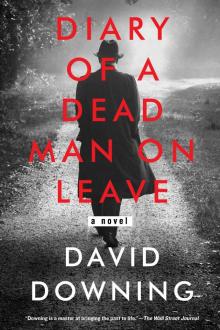 Diary of a Dead Man on Leave
Diary of a Dead Man on Leave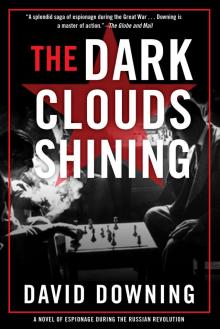 The Dark Clouds Shining
The Dark Clouds Shining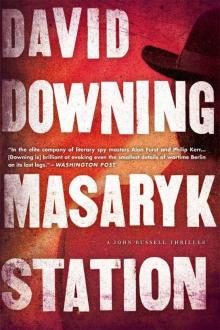 Masaryk Station (John Russell)
Masaryk Station (John Russell)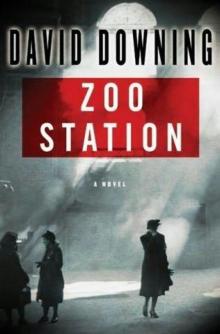 Zoo Stationee
Zoo Stationee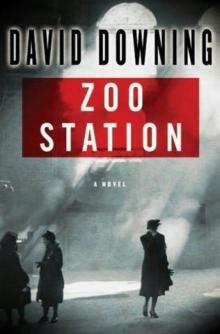 Zoo Station jr-1
Zoo Station jr-1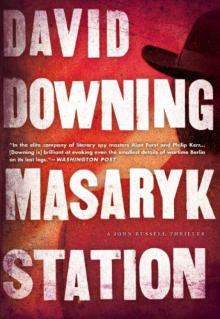 Masaryk Station
Masaryk Station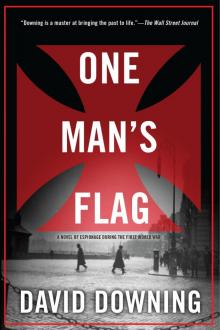 One Man's Flag
One Man's Flag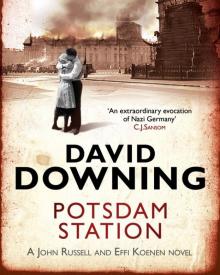 Potsdam Station jr-4
Potsdam Station jr-4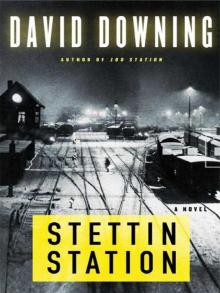 Stattin Station jr-3
Stattin Station jr-3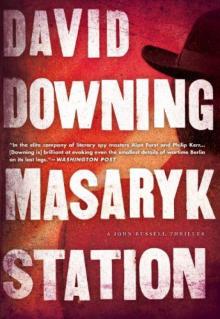 Masaryk Station jr-6
Masaryk Station jr-6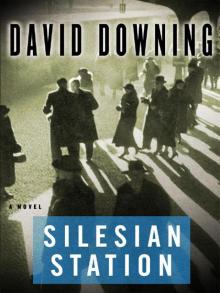 Silesian Station (2008) jr-2
Silesian Station (2008) jr-2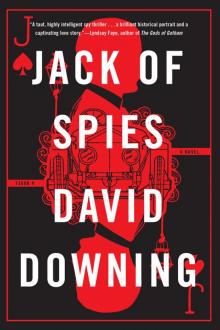 Jack of Spies
Jack of Spies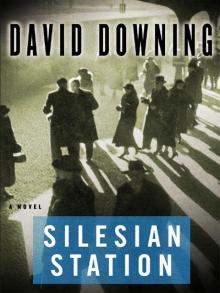 Silesian Station (2008)
Silesian Station (2008) The Moscow Option
The Moscow Option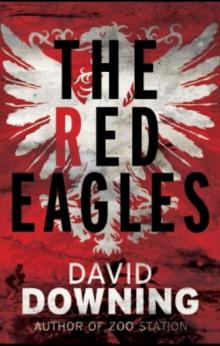 The Red Eagles
The Red Eagles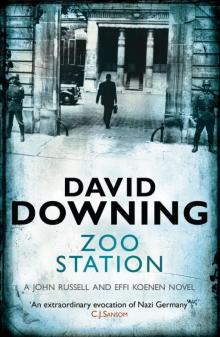 Zoo Station
Zoo Station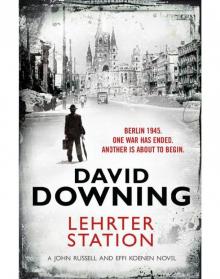 Lehrter Station
Lehrter Station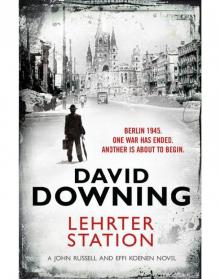 Lehrter Station jr-5
Lehrter Station jr-5